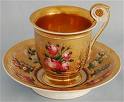
Sometimes there is a clarity that comes about understanding your mother but only after she dies. My mother was a collector of things, some quite beautiful and valuable, many that didn’t make sense like incomplete sets of china, chipped tea cups or the one-of-kind oddities. Mother only gave instructions once – “… you can only sell my things after I’m gone but not before.”
It took me a year after her passing to get up the courage to unpack all the boxes and sort through things I thought would sell at an estate sale. My husband wisely said just put in all out – the partial sets, the chipped items, the whatever.
It was impossible to get everything out and priced so we opted for a two day sale. I wondered what would people think of such a collection and would they even buy in this economy. So, with a sense of guilt we priced things with that in mind.
An early customer was a son who had brought his mother. She proudly told me she had six grown children and that she was 81 and her mother was 97. She was giddy at the thought of all the unrelated pieces she was buying — especially an odd collection of plates.
As she approached to tally up her purchases, she laughed as she said how she didn’t envy her children when she was gone. She readily confided how she loved to collect things and she freely bought whatever she liked. She even asked if there was more. When I said we were planning to put the rest out the next day, you could see her eyes start to beam as she promised she would definitely come back.
That night I found another plate that matched one of the plates I had sold to this woman. At the last minute, I set the plate aside just in case she did return. The next day there she was ready to find more treasures. I brought the plate out to her and said that I wanted her to have this and there would be no charge. She was truly overwhelmed and grateful and then she began to tell me why these plates and her other purchases were so important to her.
She began to describe that when she was a child her mother was always giving her things away to others without asking or telling her. She went on to say how it hurt her so to see her cousins playing with what was once hers. Now, she says when I buy things “I own it and no one can take it away from me.”
As she was telling her story, my brain started to replay a story from my mother which I had long forgotten. It was how during the “Depression” things were so bad that she never had new clothes. My mother had to share with her sisters and there was nothing she could afford to buy of her own for a long time.
It suddenly became quite clear to me, my mother’s odd assorted collection didn’t need to be complete, logical or perfect. Her collection of oddities not only gave her pleasure but an important sense of finally having ownership in something that was hers alone.
Trying to understand what we do and why we do it has many confounding factors, but satisfaction through pleasure is something the brain is constructed to seek and satisfy. The brain’s pleasure center has been primarily studied for sex and pain. But, I’m sure scientists will eventually discover that little nook or cranny “hot button” that offers the reassuring emotional pleasure that collecting brings. If you find personal pleasure and happiness in your collecting, know that your brain is happy too.
You Can Find Me At -

This was a great story….my mom did not collect but my motherinlaw who had a very deprived childhood as a child of alcoholics did collect china, pewter, clocks, crystal, all beautiful things that gave her pleasure…thanks for sharing this story, I collect Corningware with the old cornflower design because it reminds me of my mother and her cookware. More than pleasure, it gives me comfort…thanks, Joyce….best regards, Mary Nolan edithcrack@yahoo.com